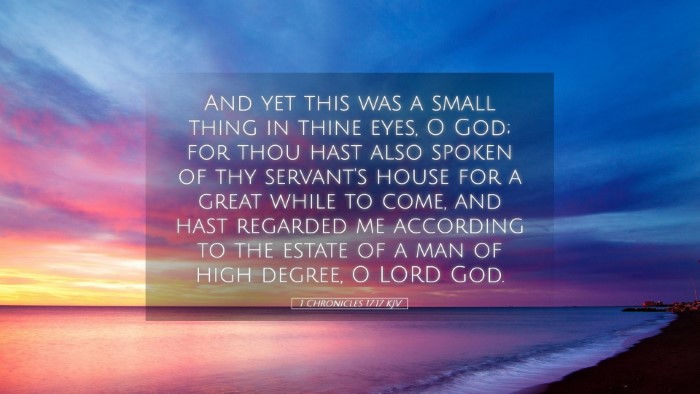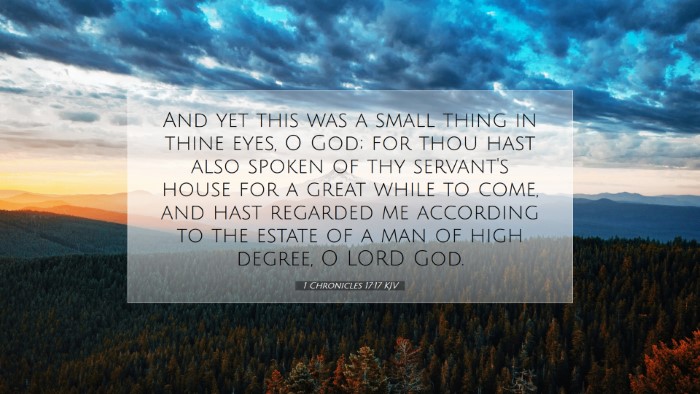Commentary on 1 Chronicles 17:17
1 Chronicles 17:17 states:
"And yet this was a small thing in thy sight, O God; for thou hast also spoken of thy servant's house for a great while to come, and hast regarded me according to the estate of a man of high degree, O Lord God."
Introduction
This verse encapsulates God's profound promise to David regarding his lineage and the establishment of his kingdom. It shows David's humility, acknowledging that God’s plans for him and his family are indeed vast compared to his humble status as a shepherd turned king.
Insights from Public Domain Commentaries
Matthew Henry's Commentary
Matthew Henry emphasizes the condescension of God in his dealings with humanity, particularly with David. He notes that:
- The awareness of God's greatness should bring us humility, as seen through David's recognition that what God proposes is far beyond what David could have imagined.
- Henry highlights God's choice of David, a man of humble beginnings, and contrasts that with God's everlasting promises towards his lineage. This serves to illustrate the theme that God's grace operates beyond human social status.
- It is also noted that David's perspective on God's covenant signifies the continuity of God's promises which extends into eternity, thus framing human history within divine sovereignty.
Albert Barnes' Commentary
Albert Barnes focuses on the implications of God's covenant with David. He outlines several critical points:
- Barnes denotes the phrase "yet this was a small thing" as indicative of God's abundant favor toward David, illustrating that David’s ascent to kingship is a mere fraction of God's greater plan.
- He explains the phrase "for thou hast also spoken of thy servant's house for a great while to come," which signifies the long-term divine purpose for David’s dynasty and the eventual establishment of the Messianic line.
- Barnes expresses that this commitment from God serves as encouragement for believers today, signifying that the divine plans include their well-being beyond earthly expectations.
Adam Clarke's Commentary
Adam Clarke offers a detailed analysis of the theological implications present in this verse:
- Clarke points out that the acknowledgment of God's favor reflects a deep understanding of God's sovereign grace. David realizes that such a promise is not due to his merit but purely from God's will.
- Additionally, Clarke discusses the significance of the "great while to come," reflecting the prophetic nature of God’s promise not just for immediate fulfillment but extending throughout generations, culminating in the Revelation of Christ.
- Describing David's self-view, Clarke highlights the humility of a servant's heart in the face of divine elevation, posing that true greatness in the Kingdom comes from humility before God.
Theological Themes
This verse brings forth several significant theological themes relevant for pastoral teaching, theological study, and scholarly exploration:
- Covenant Theology: The promise to David emphasizes the nature of God as a covenant-keeping God who engages with humanity and commits to His promises across time.
- Grace and Humility: David's reaction serves as a reflection of the believer's posture towards God's grace, accentuating that recognizing one’s humble state before God leads to a greater appreciation of His mercy.
- The Sovereignty of God: God's overarching plans reveal the sovereignty through which He operates, indicating that human actions, no matter how grand, are beneath His divine intention.
- Prophetic Revelation: The mention of the future blessings demonstrates God’s ability to foresee and direct human history towards a specific goal, culminating in the coming of Christ.
- Legacy of Faith: The implications of God's promise extend not only to David but to future generations, encouraging believers to foster a legacy rooted in faithfulness to divine calling.
Conclusion
1 Chronicles 17:17 provides profound insights into God's nature, His promises, and the appropriate response of humility from David. As pastors, students, theologians, and scholars engage with this verse, it invites a deeper contemplation of God's ongoing work in history and the legacy that believers are invited to participate in through faith and obedience.


